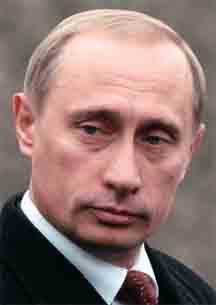MOSCOW (Reuters) – Vladimir Putin declared yesterday that he planned to reclaim the Russian presidency in an election next March that could open the way for the former KGB spy to rule until 2024.

The announcement, greeted by a standing ovation at a congress of the prime minister’s ruling United Russia party, ended months of speculation over whether he or President Dmitry Medvedev would run.
The two have ruled in a power ‘tandem’ since Putin was forced by the constitution to yield the presidency in 2008 after serving a maximum two consecutive terms, and Putin said they had agreed several years ago how to divide power between them.
It was Medvedev who proposed his mentor return as president before thousands of party members in a Moscow sports stadium.
“It is a great honour for me,” Putin told the audience. “Thank you, I hope for your support.”
Putin, 58, described in leaked US diplomatic cables as the “Alpha dog” in the tandem, then left the stage and embraced Medvedev. He also proposed his younger and more liberal protege replace him as prime minister after the election to lead a young reformist government.
Over 11 years in power, Putin has cultivated the image of a vigorous leader and been filmed riding bare chested on horseback, scuba diving and showing his judo skills.
His policies — crushing a Chechen separatist rebellion, taming super-rich businessmen and bringing wayward regions to heel — have similarly won him popularity among Russians.
But critics say his return to the Kremlin, virtually unopposed, could herald an era of economic and political stagnation in the world’s largest country.
In an initial reaction, Washington said it expected to keep making progress in the “reset” in relations with Moscow, whoever was the next Russian president.
“While we have had a very strong working relationship with President Medvedev, it’s worth noting that Vladimir Putin was prime minister throughout the reset,” White House spokesman Tommy Vietor said.
In carefully choreographed scenes, Putin had earlier yesterday proposed Medvedev, 46, to lead United Russia’s list of candidates for a parliamentary election on Dec. 4.
This will prepare Medvedev for a role in government. The move is also intended to help reverse a decline in support for United Russia and boost its hopes of maintaining its two-thirds majority in the State Duma lower house.
“I want to say directly: (Medvedev and I) reached an agreement between ourselves long ago, several years ago, on what to do in the future, on who should do what,” Putin said.
“But both I and Dmitry Anatolyevich Medvedev believe that this is far from being the most important thing — who will do what, who will sit in what place. What is far more important is something else: how we will all work, what results we achieve, and what the citizens of our country think of this.”
Opinion polls show other potential candidates, such as nationalist Vladimir Zhirinovsky or Communist Gennady Zyuganov, have much less support and Putin will easily be elected.
The main liberal opposition leaders such as former Prime Minister Mikhail Kasyanov have only limited appeal nationwide and Kasyanov’s party has been barred from taking part in the parliamentary election.
The next president will be elected for six years and the constitution still limits the head of state to a maximum of two straight terms — meaning Putin could be in power for 12 years.
Investors had been urging him to announce his plans because the political uncertainty has deterred many from putting money into the $1.5 trillion economy of the world’s largest energy producer.
As president from 2000 to 2008, Putin oversaw an economic boom where household incomes improved on the back of a rise in global oil prices and his tough talking and macho image helped restore Russia’s self confidence on the world stage.
But Putin, who was once a KGB officer in East Germany, is widely seen as more conservative than Medvedev and critics accuse him of riding roughshod over human rights and democracy, and restoring the power of the security forces.
Some economists say his return to the Kremlin makes it less likely that Russia will carry out much-needed changes such as pension reforms and reducing Russia’s dependency on natural resources. Oil and gas revenues make up half the budget.
But Chris Weafer, a strategist at Troika Dialog investment bank, said the need for change made it impossible for Putin not to carry out reforms.
“There will not be a return to the government style and agenda priorities of the previous Putin administration. That simply is not an option,” he said.
Some experts fear a return to the economic stagnation of the 1970s and early 1980s under Soviet leader Leonid Brezhnev if reforms are made, and problems such as corruption will remain.





